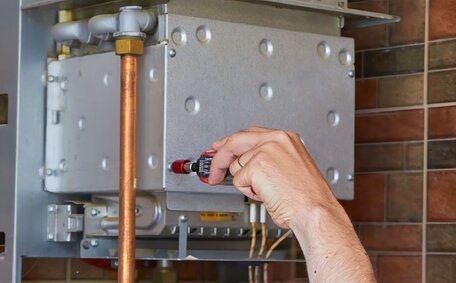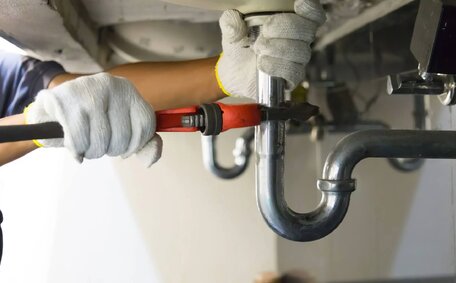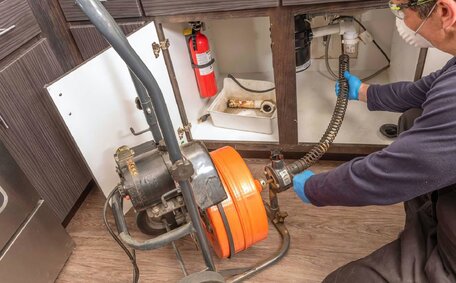Introduction: Saving Money While Preparing Your Hot Water Heater For Winter
Prepare your hot water heater for winter to enhance efficiency, reliability, and cut costs. This guide covers essential DIY maintenance tasks and outlines when it’s best to seek professional plumbing assistance.
Actions such as draining sediment, replacing anode rods, insulating tanks, and checking pressure valves can prevent system failures and costly repairs in cold weather. It also reduces wasted energy, keeping your home warm and your heater ready for the winter months.
Inspect And Replace The Anode Rod
The anode rod is a crucial component within your water heater tank that shields the unit from corrosion. Over time, the anode rod corrodes to protect the tank, effectively prolonging your water heater’s life and ensuring optimal operation. Replacing anode rods as necessary extends your water heater’s lifespan, providing reliable comfort for your household.
To check the anode rod in your storage water heater, first turn off the unit and its power supply. Then open the inspection port on top of the tank. Check the rod for significant corrosion and replace it if more than six inches of the core is showing.
It’s recommended to have a licensed plumber replace your anode rod to ensure proper installation. However, if you’re hesitant about tackling this yourself, it’s a good idea to contact Dulwich Hill Plumbing. Our licenced plumbers can expertly inspect and replace your plumbing and anode rod; don’t hesitate to contact a plumber to help safeguard your hot water system this winter.
Flush Out The Tank And Remove Sediment Buildup
Sediment and mineral deposits can accumulate at the bottom of your water heater tank over time. This trapped heat forces your system to overwork, leading to energy waste.
Annually flushing out your water tank to remove sediment is crucial, allowing your heater to operate more efficiently and meet winter water demands. Here’s how:
- Turn off the hot water heater and water supply.
- Attach a garden hose to your tank water system’s drain valve near the bottom.
- Open the drain valve and let water flow out until it runs clear with no sediment. This can take 5-10 minutes.
- Close the drain and refill the tank by turning the water supply back on.
- Restart your hot water heater.
Regular tank flushing is an effective way to save energy and reduce utility bills while maintaining hot water efficiency. If you’re unsure how to flush the tank, Dulwich Hill Plumbing is here to provide this service.
Check The Temperature Pressure Relief Valve
The temperature pressure relief valve, or TPR valve, is a critical safety component of your hot water system. This valve helps prevent disasters which your heater can cause explosion or overpressurisation by releasing excess pressure if your tank reaches 210°F or exceeds safe pressure levels.
It’s important to check your TPR valve now to ensure your system’s integrity and safety against winter’s rigours. Follow these steps to inspect your TPR valve:
- Locate the TPR valve on your hot water tank. It will have a lever or knob on top.
- Visually check the valve and related pipes for damage or corrosion. Make sure nothing is blocking the valve.
- Lift the lever or push the knob to release pressure and ensure that water discharges correctly.
- If no water is released or if issues are spotted, contact Dulwich Hill Plumbing so a skilled plumber can promptly replace the valve.
Annual TPR valve checks are crucial for the safe heating of your family’s water. A functioning valve prevents disastrous tank failures from excess pressure or heat. Ensure this vital component of your heater winter works properly before the cold season hits.
Insulate Pipes And Storage Tanks For Efficiency
Insulating pipes and tanks effectively improves hot water system efficiency and reduces utility bills. The right insulation dramatically slows heat loss and can account for reduced energy consumption, helping keep water hot and costs down.
Foam pipe insulation is ideal for insulating your pipes.
Available at hardware stores, it comes in tubing sized to fit common pipe diameters. Slit it lengthwise, wrap it around pipes, and seal the seam. Ensure insulation covers both hot and cold pipes to maintain warmth and prevent heat loss in water flow.
For tankless water heaters, wrapping the heating element with an insulation blanket provides excellent protection against heat loss.
This approach ensures more heat energy remains in your heating system, allowing your unit can maintain the desired temperature efficiently.
Take some time to do winter insulation updates, ensuring your water heater can retain more heat energy. Our team at Dulwich Hill Plumbing can also advise on the best insulation solutions for your home’s plumbing system and may offer professional installation services.
Set Your Water Heater’s Thermostat To 120°F For Energy Savings
Set your water heater’s thermostat to about 120°F to significantly boost energy savings. Each 10°F temperature reduction can save 3-5% on heating costs, especially with gas hot water systems.
Most water heaters come factory preset to 140°F, higher than necessary for most households. Scalding temperatures are among the most common reasons for a waste of energy in maintaining heat. By tuning your thermostat down to 120°F, your shower remains comfortably warm with less energy for heating.
We recommend a simple adjustment to the setting for optimal energy usage.
On gas hot water systems, a dial on the outside of the tank conveniently controls the temperature. For your electric hot water system, remove the access panel to adjust the thermostat. We recommend hiring a professional plumber if you are unsure about this.
Be sure to lower your temperature incrementally and check water heaters after each adjustment. Smaller 10°F reductions allow you to find the lowest comfortable setting for your home. Contact Dulwich Hill Plumbing if you need assistance adjusting your water heater’s thermostat for winter.
Test The Flood Stop System And Inspect Vents
It’s important to test your hot water heaters’ flood stop valve annually before winter. This valve shuts off water flow if a leak occurs, preventing extensive water damage to your home.
To test it:
- Locate the flood stop valve on the water lines near your hot water heater.
- Trigger the flood stop by pressing the button or toggle switch. You should hear a click as it activates.
- Check your hot water taps; there should be no flow within 30 seconds.
- Reset the valve; there should be no reduction in water pressure.
If the flood stop fails, contact Dulwich Hill Plumbing, offering exceptional plumbing services, to replace it.
Annually inspecting your water heater’s overflow pipe and temperature/pressure relief valve vents is also essential. Make sure they’re clear of debris so hot vapours can vent properly this winter.
For professional vent inspections or flood stop replacement, Dulwich Hill Plumbing can help prepare your system for winter.
Contact A Professional For Additional Maintenance And Servicing
While regular DIY maintenance can keep your system running efficiently, having your solar hot water panels checked by a professional plumber as part of your seasonal routine is wise before winter. At Dulwich Hill Plumbing, our licensed technicians offer comprehensive hot water unit tune-ups.
We cater to various water heater needs with services that include flushing sediment, replacing anode rods, checking valves, testing pressure relief systems, and more. Our extensive maintenance service also covers:
- Inspecting all components for wear, corrosion, or other damage
- Checking insulation levels and adding more as needed
- Adjusting thermostat settings for maximum efficiency
- Checking electrical connections
- Clearing vent pipes
- Testing functionality and safety features
Ensure the winter readiness of your hot water unit. Contact Dulwich Hill Plumbing today at 1300 349 338 or [email protected] for comprehensive maintenance. Investing in professional servicing ensures your system is safe, efficient, and ready winter.
Conclusion: Staying Ahead Of Problems And Protecting Your Investment
In summary, taking key steps to prepare your hot water system for winter can pay dividends through improved efficiency, lower energy bills, and reliable operation during cold weather. This approach helps to avert expensive breakdowns and maintains uninterrupted access to hot water.
An annual DIY tune-up offers guidance on becoming a proactive part your household’s routine, including sediment removal, anode rod replacement, tank insulation, and safety checks. While simple to perform, These proactive maintenance measures are crucial for winterizing your unit, protecting your investment and keeping it running at peak condition.
Hiring a professional who can offer comprehensive servicing provides tips to safeguard your water heater with an added layer of protection. At Dulwich Hill Plumbing, Our licenced technicians thoroughly inspect all system components, fine-tune settings for efficiency, check plumbing electrical connections, and confirm proper functionality before water heater winter challenges set in.
Don’t wait until there’s an issue to service your hot water infrastructure. Book maintenance now for proactive care, enhanced efficiency, and assurance of your water heater’s reliable operation during winter.






